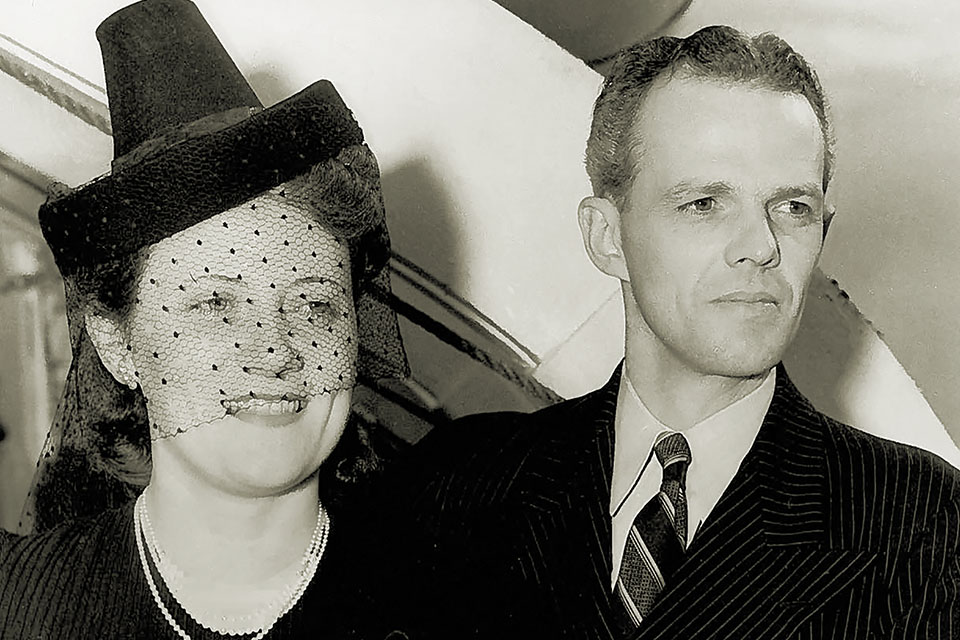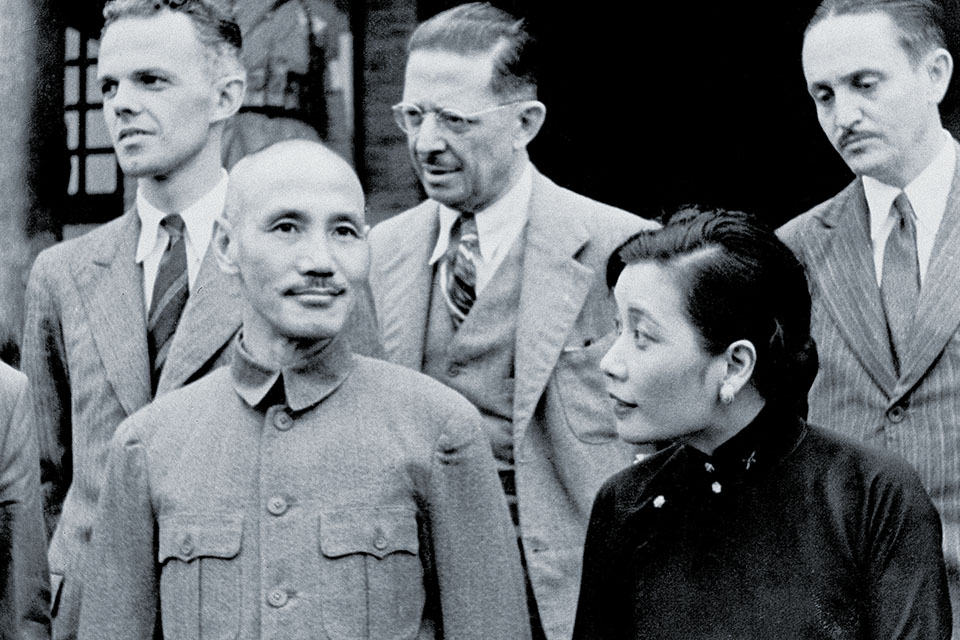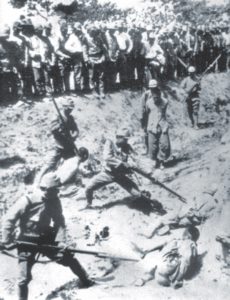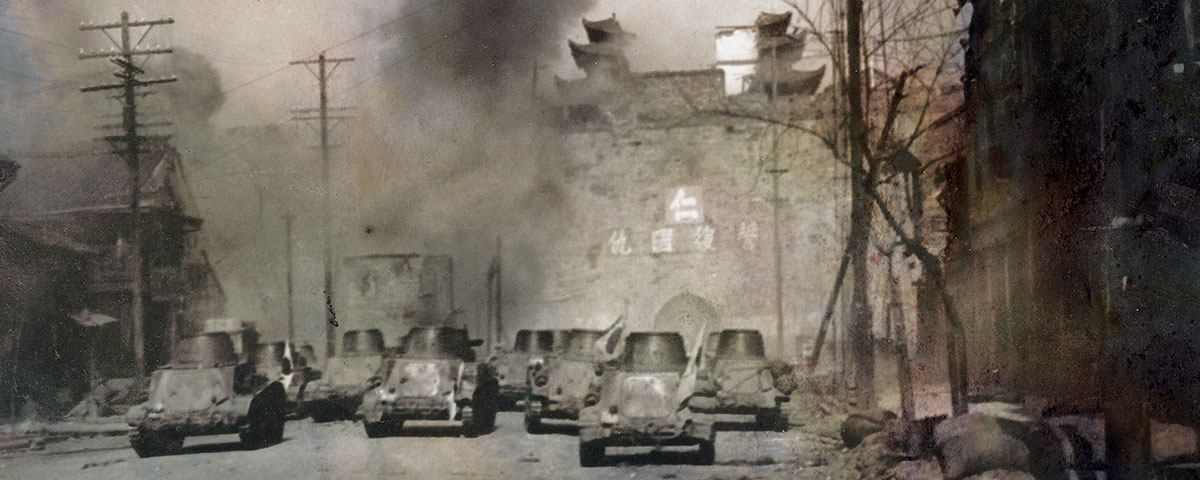On Sept. 20, 1937, C. Yates McDaniel of the Associated Press had a long and sober discussion with wife Natalie in their home on the outskirts of the besieged Chinese city of Nanking (present-day Nanjing). The 21-square-mile city, perched along the Yangtze River and ringed by massive 500-year-old walls and ornamental gates of granite and limestone, was under siege. In the nearly 11 weeks since Japan had invaded China, initiating the Second Sino-Japanese War, the fighting had devolved into brutal, full-scale combat. The Japanese military was massed around Nanking and had warned its 1 million residents—as well as any foreigners who remained—it would intensify its bombing campaign starting at noon the next day.
American and Chinese friends pleaded with the McDaniels to leave the city. The couple had just completed an arduous, eight-day return trip from northern China, first to Shanghai by car and from there as ride-along passengers in an ambulance. The nightlong drive from Shanghai had been especially harrowing, as the constant menace of Japanese bombers forced drivers to keep their headlights switched off. With the specter of war at the gates of Nanking, the couple decided to leave their home for the sanctuary of the U.S. Embassy, but they resolved to remain in Nanking “so long as there is any vestige of communications with the outside world.”
For the venturesome couple it was a typical decision.
The McDaniels were old hands in East Asia. Born in Boston in 1907, Natalie Olga (née Ellis) McDaniel grew up in Japan and learned to speak the language, often telling people she did multiplication better in Japanese than English. Charles Yates McDaniel was born in 1906 to American Baptist missionaries in Soochow (present-day Suzhou), China, and grew up speaking English and Mandarin. His father sent the young man stateside to attend the University of Richmond, followed by graduate studies at the University of North Carolina, where he wrote his thesis on Washington Irving’s interest in drama. Yates joined the Associated Press in 1935 and returned to East Asia.

Yates was not the stereotypical rugged, glamorous foreign correspondent. “He was a slender man,” wrote author John Toland. “His high forehead, light brown eyes and delicate, almost transparent skin gave him the aesthetic look of a poet or monk.” Unlike his strict Baptist father, who shunned alcohol and tobacco, Yates was a chain smoker. By age 35 his dark brown hair had turned grayish-white, which Time attributed to “enough narrow escapes to earn many a thread of silver.”
After years of picking around the edges of China, Japan launched its full-blown invasion on July 7, 1937. By late September its forces had captured Peking (present-day Beijing) and were closing in on the port city of Shanghai. Nanking was the capital of the Chinese Nationalist government under Chiang Kai-shek, yet the city had thus far suffered only light bombing raids—but few thought that would last. In late August the British military attaché in Nanking warned an American diplomat the Japanese intended to destroy the city with high-explosive, incendiary and gas bombs.
On September 21 Nelson T. Johnson, the American ambassador to the Republic of China, evacuated the embassy in Nanking and took refuge with his staff aboard USS Luzon, one of a fleet of gunboats protecting U.S. interests along the Yangtze. McDaniel reported on the circumstances. “A disagreement on policy was believed to have risen between Ambassador Johnson and Admiral Harry Yarnell, commander in chief of the United States Asiatic Fleet,” the correspondent wrote. “Yarnell was known to be strongly against any yielding to the Japanese threat and was thought to have opposed Johnson’s evacuation of the embassy.” McDaniel chided the ambassador and his staff for remaining “safe aboard” the gunboat Luzon, which “kept full steam up.” The message was clear: If the correspondent and his wife were willing to ride out the Japanese air raid at the embassy, why wasn’t the ambassador?
When the Japanese ultimatum expired at noon that day, Yates and Natalie were among 19 Americans at the embassy, eight of whom were women. The only embassy official to remain was secretary J. Hall Paxton, who like McDaniel was the son of American missionaries in China. Unsure how long they would be in the embassy, they did a quick inventory of supplies and discovered enough food to last three months. The ultimatum came and went, yet not a single Japanese plane appeared that day. “If it was not for the electric air of nervous tension,” McDaniel wrote, “Nanking would seem like a great city waiting for death.”
At 10:35 the next morning, McDaniel recalled, the air raid sirens “screamed out their dreaded warning.” Citizens took cover in shelters as 13 Chinese-flown Curtiss Hawk fighters headed off to engage the incoming enemy planes. Minutes later some three-dozen Japanese bombers flew over in formation, dropping high-explosive and incendiary bombs, as Chinese anti-aircraft batteries roared into action. McDaniel witnessed four Japanese bombers shot down, but a second group dropped incendiaries that ignited huge fires in a slum district near the river. “The huts burned like matchboxes,” McDaniel recalled. Though he had covered civil wars in China, the sight of “women, children and old men already burned to death or beyond aid” sickened him.

The Americans in the embassy emerged unscathed, the only real danger coming from a wayward Chinese antiaircraft shell that crashed outside the compound, splattering its gatehouse with shrapnel. That night Johnson and staff returned to the embassy, the ambassador announcing his intention to remain in Nanking. “Americans here,” McDaniel sniped, “assumed the ambassador had received instructions to return from Washington.”
A few days later waves of Japanese bombers pummeled Nanking for seven hours, putting its waterworks out of commission and destroying its $1 million power plant. McDaniel joined Johnson and his staff on the embassy veranda to observe the raid and saw two Japanese planes fall from the sky “like comets with tails of smoke and fire.”
Two months later Natalie joined the foreign exodus for Shanghai. American officials welcomed her aboard a rescue ship, but limited her to two suitcases weighing no more than 20 pounds each. That presented a problem, as the McDaniels’ beloved Scottish terriers, Sandy and Lassie, weighed 18 and 19 pounds, respectively. Ever resourceful, Natalie boarded wearing four suits and two topcoats, her pockets stuffed with jewelry—and a dog under each arm.
Yates took his chances and remained in Nanking.
On December 5 McDaniel drove east from the city, hoping to “find the war.” Thirty miles out he knew he’d succeeded when a Japanese shell exploded some 200 yards in front of his car. Chinese troops were busy burning villagers’ homes, crops—anything that might sustain the Japanese. As McDaniel watched Chinese artillery and machine guns open up from a nearby ridge, a column of reinforcements marched up the road from Nanking. “We are from Canton,” one of their officers explained. “We are cold and know nothing about what is taking place over that ridge. But Generalissimo Chiang Kai-shek told us to hold this road. And we will hold it until we are all killed.”
The correspondent returned to Nanking to file his story. The next day Lt. Cmdr. James J. Hughes of the gunboat USS Panay offered to evacuate McDaniel and the four other Western correspondents who’d remained at the embassy—Archibald Steele of the Chicago Daily News, F. Tillman Durdin of The New York Times, Leslie Smith of Reuters and Paramount newsreel photographer Arthur Menken. All declined. They were there to report, and McDaniel perhaps took the greatest chances.
On December 7 he drove just 15 miles east of town before encountering villages set afire by the retreating Chinese. On passing the landmark hot springs at Tangshan, McDaniel spotted a Japanese battery a few hundred yards ahead and realized he’d stumbled into the no-man’s-land between the warring armies. He quickly spun the car around and returned to Nanking, which soon came under intense Japanese assault.
On December 9 at Nanking’s southeastern gates McDaniel tagged along as Chinese troops rushed to meet advancing Japanese forces. But when enemy aircraft roared overhead, dropping bombs, the correspondent “ducked into a dugout.” When the ground stopped shaking, he peered out. The soldiers he’d been following lay dead or horribly mangled. “I left,” McDaniel tersely wrote.
By December 11 the Nanking riverfront was in chaos. McDaniel watched as Panay “steamed up the Yangtze amid loud explosions as shells continued to burst in
the river ahead of the quivering gunboat, throwing up great geysers of water.” Panay continued upriver and out of McDaniel’s sight. The next afternoon a trio of Japanese Yokosuka B4Y1 bombers targeted the gunboat despite its clear markings, including American flags painted on the deck. At least two bombs struck home, and as the crew and passengers abandoned ship, a flight of nine Nakajima A4N fighters strafed them. Three American sailors and an Italian journalist were killed, and nearly 50 others were wounded. Panay sank just offshore. The Japanese government apologized, claiming the attack had been an accident, and it later paid a $2.2 million indemnity to the U.S. government. But the incident served to turn American public opinion against the Japanese.
Meanwhile, downriver in Nanking the city had ceased to function. Banks and groceries had closed their doors, and the raids had knocked out lights and plumbing. The stench of human waste filled the air, while smoke from burning villages blanketed the city. Citizens began to flee by the thousands, choking the streets. As McDaniel maneuvered his car carefully through the throngs, a few desperate Chinese jumped onto the car’s running board. The correspondent split his time between fending them off, steering, ducking bullets and observing the exodus.
On December 13 McDaniel was driving along the city’s north wall when Japanese soldiers came pouring through a breach. As one ran toward the car with rifle at the ready, McDaniel prudently stopped and emerged slowly from the car with hands held high. After ascertaining his identity, the Japanese allowed him to observe. The streets were littered with corpses. Balanced atop a barricade sat severed Chinese heads, a biscuit stuffed in one’s mouth, a pipe in another’s.
Accompanied by newsreel photographer Menken, McDaniel witnessed Japanese soldiers looting throughout the city, including one who forced a civilian at bayonet point to fork over the equivalent of several thousand dollars. The correspondents also watched in horror as a Japanese staff car bounced and skidded over the bodies of men and horses choking one of the city gates.

on an orgy of atrocities that included mass rape and the murders
of untold thousands of civilians and disarmed Chinese soldiers. (Ullstein Bild via Getty Images)
At the situation devolved, McDaniel and the other Westerners urged Chinese soldiers to abandon their weapons, change into civilian clothes and head for the safety zone in Nanking set up by international diplomats and clergy. Believing they had saved at least some of the troops from execution, McDaniel and the four other Western reporters had to figure out a way to get their stories out of the city. Durdin commandeered a car to reach Shanghai, but 60 miles outside town Japanese soldiers forced him to turn back. On December 14 the correspondents made their way to the wharf on the Yangtze River. There they asked a young Japanese naval officer to radio Panay to rescue them. The lieutenant apologized, explaining that Panay had been sunk.
The next day the stunned correspondents headed down to the Yangtze’s left bank, where two Allied gunboats were anchored. Smith grabbed a spot on the British gunboat Ladybird, while Steele, Durdin and Menken boarded the U.S. gunboat Oahu. McDaniel chose to stay one more day and returned to the embassy. When Japanese soldiers attempted enter the building, McDaniel firmly told them, “No!” and they left.
There was no water in the embassy for the Chinese staff, so McDaniel filled buckets from a street well. It was unsafe for any Chinese to be out on the streets. He volunteered to help one embassy servant find her mother, only to find the woman’s body in a ditch. Peering into the dusk, McDaniel watched as sword-wielding Japanese soldiers marched several hundred bound Chinese prisoners from the safety zone. Among them were soldiers the correspondent had helped disarm. None returned, he noted in despair.
The next day McDaniel returned to the wharf and boarded the Japanese destroyer Tsuga, bound for Shanghai. He certainly had stories to share, although his decision to stay an extra day had given United Press’ Archibald Steele an opportunity to scoop him. Just after boarding Oahu, Steele had persuaded the U.S. Navy radio operator to break regulations and send his story. “I think he slipped him a $50 bill or something,” Times correspondent Durdin joked years later. Steele’s story ran in the December 15 Chicago Daily News.
As Tsuga raced down the Yangtze, McDaniel was able to persuade the Japanese officers to transmit his own horrifying account of Nanking’s death throes. “Throughout the night I heard wild cries of Chinese, rifle fire and deafening explosions,” he wrote in a story that appeared in stateside newspapers on December 17.
When he arrived in Shanghai that day, nearly three months after he and Natalie made their fateful decision to stay in Nanking, McDaniel filed a grim diary of the city’s final days. Its conclusion was heartrending.
En route to the river saw many more bodies in the streets. Passed a long line of Chinese, hands tied. One broke away, ran and dropped on his knees in front of me, beseeching me to save him from death. I could do nothing. My last remembrance of Nanking: dead Chinese, dead Chinese, dead Chinese.
To McDaniel and the other Western correspondents the Japanese invasion of China and genocide in Nanking marked the true beginning of World War II. The Japanese had indulged in widespread looting, burned one-third of the city to the ground, killed some 100,000 Chinese soldiers, brutally murdered tens of thousands of Chinese civilians (reliable estimates range between 80,000 and 100,000) and raped untold thousands of Chinese women. McDaniel and his colleagues had risked all to “help inform the outside world of the heightening crisis.”
During the world war to follow, Yates and Natalie McDaniel routinely accepted those risks. In one tally Natalie figured she’d been “eight times a refugee from the Japanese.” After the February 1942 fall of Singapore, Yates and a handful of escapees were briefly stranded on a desert island. He made the best of it, tapping out a story on a manual typewriter perched atop a downed palm tree, prompting a fellow survivor to later joke, “This was going to be the biggest scoop of his career.” The Associated Press talked up its correspondent, boasting that McDaniel had been “the first American correspondent to arrive and the last to leave Singapore.” After his subsequent narrow escape from Java to Australia, Time ran a flattering profile of him.
Yet when C. Yates McDaniel died quietly in St. Petersburg, Fla., on March 14, 1983, few outside his family paid much attention. In the four decades since the war the public had largely forgotten McDaniel, despite his having been fully the equal of such war correspondents as Ernie Pyle of Scripps-Howard and Edward R. Murrow and William L. Shirer of CBS.
The 76-year-old seemed like just another white-haired retiree who had passed his final years amid so many other senior citizens in Florida. The only hint he had been anyone special came from a sparse obituary buried in The New York Times. It suggested peril and courage and a past far more fascinating than most others knew. Friends and relatives knew he’d spent the postwar years writing about the automotive industry in Detroit and politics in Washington, D.C., for the Associated Press. But even those who’d worked alongside him were startled to learn what McDaniel had seen, what he had done and what he had survived as a young man when the world was at war.
Jack Torry is the Washington bureau chief of The Columbus Dispatch and Dayton Daily News. He has covered politics, legal affairs and Congress in the nation’s capital since 1989. He and wife Saundra live in Leesburg, Va. For further reading he recommends The Rape of Nanking, by Iris Chang, and Shanghai Grand, by Taras Grescoe.





